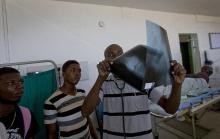Against Their Will: MSF Report on Sexual Violence in Haiti
Doctors Without Borders, also known by its French acronym MSF, has released a report on sexual violence in Haiti. Gender-Based Violence (GBV) is a human rights and a public health issue as it can cause mental trauma, unwanted pregnancies, and transmission of HIV and sexually transmitted infections. Stigma remains intense in Haiti due to lack of access to justice and survivor-centered health care. In 2015, MSF opened a clinic in Port-au-Prince that specializes in providing health and psychological support to GBV survivors. Take a look at the report (available in English and French with summary below), and if you would like to support MSF, you can do so here.












